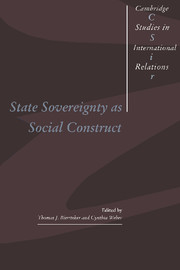Book contents
- Frontmatter
- Contents
- List of figures
- List of contributors
- Acknowledgments
- 1 The social construction of state sovereignty
- 2 Contested sovereignty: the social construction of colonial imperialism
- 3 Beyond the sovereignty dilemma: quasi-states as social construct
- 4 The sovereign state system as political-territorial ideal: historical and contemporary considerations
- 5 Sovereignty and the nation: constructing the boundaries of national identity
- 6 Sovereignty, nationalism, and regional order in the Arab states system
- 7 Binding sovereigns: authorities, structures, and geopolitics in Philadelphian systems
- 8 Hierarchy under anarchy: informal empire and the East German state
- 9 Reconstructing the analysis of sovereignty: concluding reflections and directions for future research
- Index
- Titles in the series
2 - Contested sovereignty: the social construction of colonial imperialism
Published online by Cambridge University Press: 01 June 2011
- Frontmatter
- Contents
- List of figures
- List of contributors
- Acknowledgments
- 1 The social construction of state sovereignty
- 2 Contested sovereignty: the social construction of colonial imperialism
- 3 Beyond the sovereignty dilemma: quasi-states as social construct
- 4 The sovereign state system as political-territorial ideal: historical and contemporary considerations
- 5 Sovereignty and the nation: constructing the boundaries of national identity
- 6 Sovereignty, nationalism, and regional order in the Arab states system
- 7 Binding sovereigns: authorities, structures, and geopolitics in Philadelphian systems
- 8 Hierarchy under anarchy: informal empire and the East German state
- 9 Reconstructing the analysis of sovereignty: concluding reflections and directions for future research
- Index
- Titles in the series
Summary
The constitutive interplay between state and sovereignty enters into fundamental debates on the nature of the international system. From a realist or liberal perspective, the state is an independent actor in exchange, competition, and conflict with other states. States emerge as organized powers that demand recognition and are constrained only by a web of voluntary compacts. From this perspective, a theoretical focus on sovereignty is misleading when it directs attention toward a derivative realm of understandings and interpretations, and away from the relations of power and interest that generate behavior.
In institutional and poststructuralist accounts, by contrast, the state is seen as embedded within a larger cultural framework. Sovereignty is viewed here as a social status that enables states as participants within a community of mutual recognition. From this perspective, a focus on the state misleads when it treats political actors as natural or exogenous, while directing attention away from the larger community and culture that construct states with specific capacities and warrants.
International legal theory parallels the opposition between realist and institutional accounts in debates over whether international recognition is declaratory or constitutive of statehood. A declaratory theory holds that states exist independent of recognition and that recognition signals that other states have become aware of a new state; a constitutive theory holds that states have no standing in the absence of recognition, which can be said to construct them as international persons.
- Type
- Chapter
- Information
- State Sovereignty as Social Construct , pp. 22 - 49Publisher: Cambridge University PressPrint publication year: 1996
- 56
- Cited by

